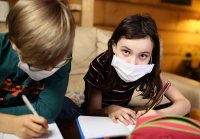What Past Education Emergencies Tell Us About Our Future
With schools closed in 185 countries, experts who’ve studied school emergencies around the world share insights about the impact on kids.
Your content has been saved!
Go to My Saved Content.About 9 out of 10 students are out of school worldwide right now, writes Anya Kamenetz for NPR—a global school shutdown on an unprecedented scale. While no historical event is identical to the coronavirus pandemic, Kamenetz spoke with experts in the field of “education emergencies,” probing for lessons learned in regions that experienced extended school closures due to humanitarian crises such as Hurricane Katrina, the Rwandan genocide, or Ebola in West Africa.
Widespread school closures, she found, have deep and lasting impacts on kids, affecting both long-term academic metrics and mental health, for example. But there are things educators and school leaders can do now, and plan for down the road, to keep kids academically engaged and emotionally connected to their school communities.
“[Students] will need lessons and school structures that help them cope with the new realities, that give them hope and the skills they need to be part of the solutions,” Kamenetz writes. “This might mean assessing students’ new starting points, summer school, remediation or acceleration. It might mean studying public health and epidemiology. It will certainly mean social and emotional supports that help children, teachers, and families recover from this unprecedented break.”
The big insights from the crisis experts broke down into the following categories:
Make Every Effort to Keep Teaching
Despite a worldwide gap in internet connectivity and the availability of tech tools like computers and phones—plus the complexity of supplying special education remotely—continuing to provide instruction is critical. Every effort should be made to reach as many students as possible, experts say, and equity should be at the forefront of this work. “The choice to do nothing, because it can’t reach all immediately, ends up just exacerbating existing inequalities,” says Sarah Dryden-Peterson, a researcher at Harvard Graduate School of Education, noting that well-off families will work hard to keep kids’ learning going through school closures.
This aligns with what’s considered best practice by the international aid community. “Don’t stop helping people just because you can’t help everyone, but definitely have a pro-equity lens,” says Rebecca Winthrop, co-director of the Center for Universal Education at the Brookings Institution.
Expect a Social and Emotional Impact
Especially for kids who already have risk factors in their lives—what researchers call adverse childhood experiences, or ACEs: the cumulative effect on children of traumatic events like physical or verbal abuse, death, substance abuse by a parent—the added disruption of widespread school closures will have an impact on kids’ brain development.
“Their social and emotional well-being is at risk,” says Sarah Smith, senior director of education at the International Rescue Committee, and we should expect to see both short- and long-term consequences.
But there are things educators can do right now to help offset the traumatic impact of the pandemic and the difficult adjustments kids must make while partaking in distance learning. When teachers keep in close contact with their students, these negative impacts can be reduced. That’s especially true when these efforts are “provided in a way that continues learning in some form," says Winthrop. "They can be a real protective factor against anxiety and depression for kids."
It Will Take Time to Catch Up
After most New Orleans public schools closed for the entire fall term due to Hurricane Katrina, Doug Harris, a professor of economics at Tulane University, found that it took children a full two years to recover lost learning. There’s “suggestive evidence,” Harris tells Kamenetz, that the impact was worse for low-income and African American students. “The social and economic situation always bleeds into the school,” he says, exacerbating equity issues that existed before the emergency. Kids in New Orleans, he notes, dealt with a school district that completely shut down, massive job loss, the emotional trauma of a natural disaster, and collective disorientation once the city rebooted its school system post-Katrina.
Among communities affected by the 1994 Rwandan genocide, writes Kamenetz, researchers found that it took children 16 years to catch up academically.
Fewer Kids Will Graduate High School And Enroll In College
Tulane’s Harris says schools and districts should prepare for a spike in the high school drop-out rate. In New Orleans, the displacement students experienced from Hurricane Katrina—especially among kids from low-income families—affected high school graduation and college enrollment. In part, this had to do with economic factors. “Their parents just lost their jobs and they’ve got younger siblings to take care of while their parents are out trying to find work and trying to manage things,” says Harris.
Another contributing factor, says Smith, is high school kids' developmental stage. “Adolescence is a period of rapid change and rapid development. So if they’re experiencing adversity while they’re going through adolescence and another period of change, it can be detrimental,” says Smith.
Low-Bandwidth Options Work
School lessons continued during the Ebola crisis in West Africa via radio, an effective, accessible way to reach many children, says Harvard’s Dryden-Peterson. In China, she says, lessons are broadcast via TV. Text messages and social media are used by Somali refugee teachers to connect with hard-to-reach students.
However, even though mass media is widely accessible, and there are increasingly large numbers of people with access to high-speed internet, Dryden-Peterson emphasizes that the approach shouldn’t neglect “more individualized, lower-bandwidth efforts.”
